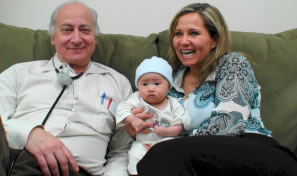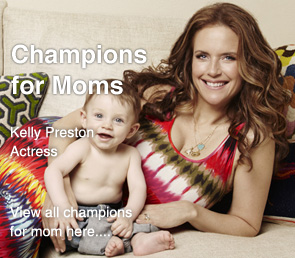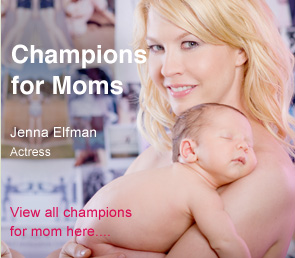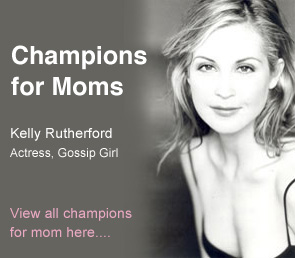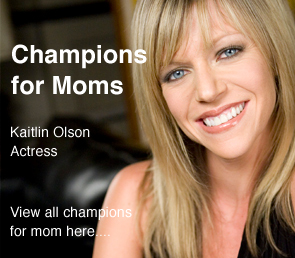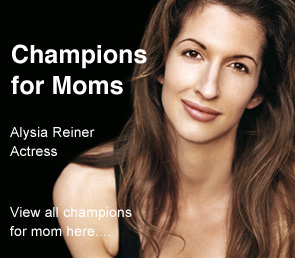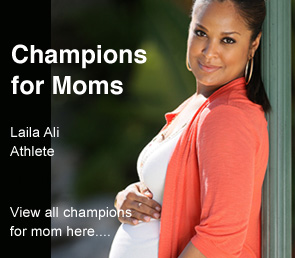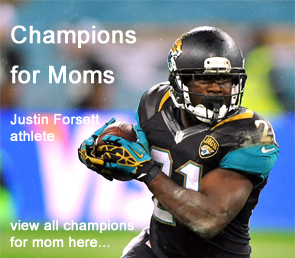Finding a Breastfeeding-Friendly Prenatal Care Provider, Hospital, and Pediatrician
By Danielle Rigg, JD, CLC and Bettina Forbes, CLC
© 2009 Best for Babes Foundation. All Rights Reserved.
Make no mistake about it, breastfeeding is a team sport! You and your little babe(s) are the main attractions, but you definitely need star players around you to succeed! In the breastfeeding arena, this translates into enlisting knowledgeable help so that you have as smooth an experience as possible. This is what we refer to as assembling your “A-Team” and it’s something that is critical for you to do while you are still pregnant. Sure, breastfeeding is a normal and instinctive behavior, but it is also a skill that both you and your baby need a bit of time and patience to master. (See our section “The Learning Curve.”)

Cheesy but true: A good A-team can coach and cheer you on!
Getting off to a good start will help you avoid the “booby traps” and unnecessary troubles. (See our section “The Breastfeeding Booby Traps.”) Your A-Team can get you to the starting line with a “can-do” attitude (essential!), help you hit your stride over any early bumps, and see you through to a rewarding finish (of your choice- not circumstances)! Sounds a whole lot better than showing up for the race of your life in flip flops, without any training under your belt, right?
A General “Rule of Thumb” to find most supportive A-Team:
The fastest way to connect yourself with the medical professionals in your community who will deliver when it comes to breastfeeding is to ask someone who daily interacts with and/or supports breastfeeding mothers — your local La Leche League leader (type your zipcode into www.llli.org), a lactation consultant (type your zipcode into www.ilca.org, www.breastfeeding.com), a labor or postpartum doula (type your zipcode into www.dona.org), or a childbirth educator. These women deal with birth and breastfeeding every day, helping new moms walk this path over and over again. They have seen the trials and the triumphs and, therefore, they usually know exactly which OB and Pediatrician to choose if you want great breastfeeding support. Plan B: If you can’t get in touch with any of these people, then you at least need to know which questions to ask when you do your interviewing. (See below.) Well, you ask, what’s wrong with trusting the recommendation of a good friend, or selecting a doctor on your own? You can. But we are interested in helping you escape the “booby traps”! And one of those traps is winding up with a doctor who really doesn’t do more than pay “lip service” to “breast is best” while women in his practice struggle through all sorts of problems and eventually give up nursing! We want you to know the sad reality that too many doctors are undereducated about nursing and/or they are too squeezed for time to deal with breastfeeding issues so that you don’t wind up not getting the help you are expecting from the person whom you expect it most. (For more on identifying physicians who are not supportive, see Dr. Newman’s handout. If you are going to rely on the advice of a friend, make sure it is someone who breastfed successfully with the help of the physician she is recommending. Not someone, who succeeded despite the poor breastfeeding help she received or someone who pitched it in early because of that lack of help.
Having said all that, there are some excellent care providers out there who can give you the breastfeeding support you need. If you can’t shortcut the search for your A-Team by contacting some of the new mother folks we mentioned above, click on each heading below for our guide on picking out each member of your A-Team and the questions to ask.
1. Find an Excellent Prenatal Care Provider: Selection Guide. Your Ob/Gyn, Family Doctor or Midwife who you will see for prenatal care, is the first line in helping you succeed. Why? First of all, studies show that “women who receive early, comprehensive breastfeeding instruction and guidance are more likely to breastfeed for at least three months and to enjoy the experience from the start.” (Guise, JM, Palda V, Westhoff C, et al., The effectiveness of primary care-based interventions to promote breastfeeding: systematic review and meta-analysis for the US Preventive Services Task Force. Annals of Family Medicine 2003; 1 (2); 70-8.) A prenatal care provider who is knowledgeable and encouraging about breastfeeding can, therefore, start the conversation with you while you are pregnant, discuss any reservations you might have, give you the pointers you need to succeed, or at least be able to point you in the right direction of help. Secondly, a great doctor/midwife knows that how you birth will impact how well (or not) early breastfeeding goes: Research shows that babies who are born after scheduled inductions and c-sections, (Dewey et al, 2003) who are the product of forced extractions (forceps and vacuums) and heavily medicated labors, (Hall et al, 2002), often have a difficult start at nursing, (Smith, 2007), which can adversely impact how long breastfeeding continues. Of course, these interventions are sometimes necessary, and the breastfeeding challenges they may present can be overcome with extra support. (See our “Fast Facts” section for more on Common Breastfeeding Problems; for more on the birth process watch Ricki Lake’s video, The Business of Being Born.) For the Prenatal Care Provider: Best for Babes Selection Guide, click here.
2. Find a Baby-Friendly™ or Breastfeeding-Supportive Hospital. Want success? Go where there is a track record for it! If you have ruled out giving birth at home or at a birth center that is known to support breastfeeding, the hospital you choose (and where you live), can determine the kind of breastfeeding help you will get. Unfortunately, only 4% -yes, that’s four percent-of U.S. hospitals are certified as Baby-Friendly™, which means they agree to implement policies and practices which are proven to result in a high rate of breastfeeding success. (Click here to find a Baby Friendly USA hospital). If a Baby-Friendly hospital is not an option, arm yourself with information: find out about your hospital’s breastfeeding track-record and the kind of lactation help available-see our Top Ten Questions to Ask Your Hospital . The CDC conducted a survey of hospitals nationwide and revealed that most hospitals are not adequately supporting breastfeeding, making it more difficult for moms to make it through the first few days or weeks, so this is incredibly important.
3. Find an EXCELLENT Breastfeeding-Friendly Pediatrician or Family Physician. We can’t stress this one enough. There are some wonderful pediatricians and physicians out there who have acquired the necessary knowledge of breastfeeding and who will become your most trusted resource and guide. However, a very recent study delivered the disappointing news that attitudes towards breastfeeding among pediatricians are getting poorer (2004, Archives of Pediatrics & Adolescent Medicine) -even though the American Academy of Pediatrics mandates that pediatricians “enthusiastically support and encourage” breastfeeding. As we said earlier, most pediatricians are undereducated about breastfeeding because they are not required to be: although more medical schools are now requiring completion of breastfeeding modules, previous graduates of medical schools are not required to undergo training. The unfair result for too many new moms and babies, is that rather than guiding them victoriously through the maze of early breastfeeding, a pediatrician who is not trained in or is, even ambivalent about breastfeeding can really undo your confidence and put you on the road to breastfeeding problems and failures.
For these reasons, we recommend that you consider your choice in your baby’s first line of care very carefully. Begin the hunting and interviewing process well before the birth. Choose well, and you will be well-prepared to meet any challenges! For more info on knowing when a physician is not supportive, see Dr. Newman’s handout.
So how do you know that you’ve got a breastfeeding-supportive pediatrician who is doing more than paying lip-service to “Breast is Best?” Here are some key questions for you to to ask:
- What percentage of your patients are breastfeeding exclusively at one month? A breastfeeding-friendly pediatrician will have many more mothers nursing than not.
- Do you have any lactation credentials? Some pediatricians are also IBCLC’s – harder to find, but some of the best. See below.
- Do you have an LC on staff or to whom you refer if needed?
- Under what circumstances, should a baby be taken off the breast and given formula? The answer should be “almost never.” Although there are instances in which formula supplementation is necessary, they are rare, and should be accompanied by a thorough assessment of why the breastfeeding challenge arose in the first place. Remember, feeding your baby formula will satisfy his/her hunger, but it will not address the underlying breastfeeding issue that caused the problem in the first place. And it will likely make whatever breastfeeding problem you are having, worse. (See our section on “Supplementing“in “Fast Facts”.) As Dr. Jack Newman, a leading pediatrician and lactation expert likes to say, “Fix the breastfeeding, and you fix the problem.” (See www.drjacknewman.com for more wonderful and accurate information).
- For how long should I breastfeed? The American Academy of Pediatrics recommends exclusive breastfeeding for the first six (6) months, continuing to at least one year with solid foods added, and beyond as long as desired. The World Health Organization recommends at least two (2) years. Beware if his/her answer is along the lines of: “Breastfeeding is best, but it’s not for everyone” or “Either is fine, it’s up to you.” A good pediatrician is unequivocal about breastfeeding and will help you work through or get help for any issues so that you can succeed, much as a coach helps you set realistic goals and achieve them. He/she should not browbeat you or be judgmental either!
- Do you know local breastfeeding resources and support groups to whom you can connect me?
Some dead giveaways that a pediatrician is not truly breastfeeding-friendly are: his/her solution to sore nipples or other breastfeeding problems begins and ends with a sampler pack of formula and coupons; formula paraphernalia strewn about the office– coupons, buttons, pens, clip-boards.
Please remember that these are simply suggested guidelines, as we believe that assembling an A-Team will give you a huge head start toward breastfeeding success!
The information in this document is in no way intended to diagnose or treat any medical condition and is not a substitute for an in-person evaluation by a breastfeeding-friendly pediatrician or qualified, independent Internationally Board Certified Lactation Consultant (IBCLC).



